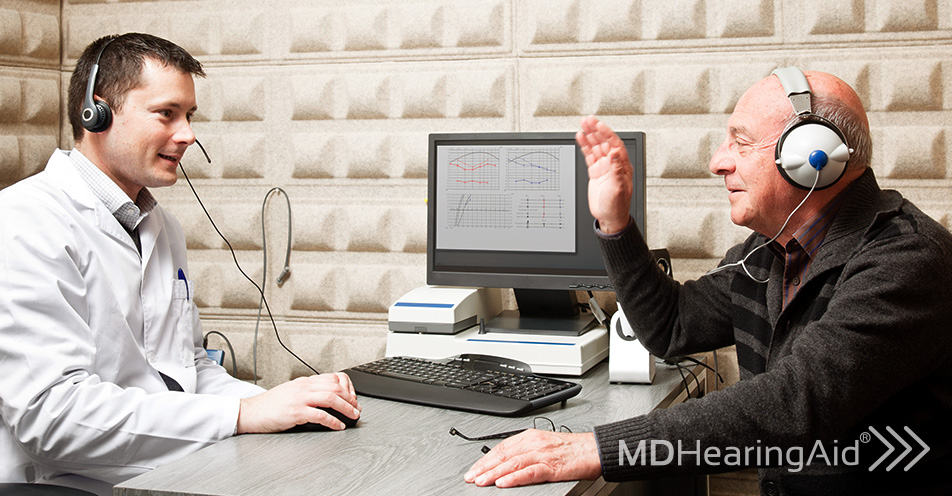While MDHearing is an online, direct-to-consumer hearing aid company, we actually encourage people to get their hearing tested with an audiologist. This is surprising to people new to our business, but we want you to completely understand the state of your hearing health. After your audiology appointment, you can email us your results and our in-house specialist can point you to the hearing aid that will work best for your needs.
If you’ve never been to an audiologist before, you may be feeling a bit apprehensive. This is completely normal. However, it is much easier to calm these feelings if you have some information on what to expect when you go to your audiology appointment. Whether you are going just to check on your hearing health or because you suspect you may have some hearing issues, here’s what you need to know about what happens at a hearing appointment.
Preparing for Your Audiology Appointment
There isn’t much you will have to do to prepare for your appointment. Just remember to bring your insurance information and any required identification or paperwork. It also helps to bring someone with you. Some audiologists will want to have a familiar voice as part of a hearing test, and it is also beneficial to have someone there to help with communication and write things down.
Pre-test Discussion
It’s important to give your audiologist as much information as possible to work with. Tell your audiologist about any hearing difficulties you’ve noticed, any balance issues, frequent ear infections (now or when you were younger), ringing in the ears, if you notice people mumbling more often than before, any trouble following conversations, and your concerns about the tests (if you have any). Note that hearing tests should not be painful or invasive and if you feel pain, you should let your audiologist know immediately.
The Hearing Tests
The main types of tests that audiologists run at your standard audiology appointment may include:
Otoscopy: This exam involves checking for ear wax, blockages, or any other physical issues with your ear canal or ear drum. Typically, the audiologist will use an otoscope (you have probably been examined with an otoscope before; general practitioners use these to check your ears as well). This will usually determine if there are any physical obstructions contributing to your hearing issues.
Tympanometry: This tests the responsiveness of your eardrum (also called the tympanic membrane) to light pressure. This should find anything that might be limiting the motion of the eardrum, such as fluid, perforation, or infection, and may determine if your hearing loss is stemming (at least in part) from your ear drum.
Audiometry: This exam checks how your hearing is functioning, including how your ears interpret sounds via air conduction and bone conduction. You will be seated in a soundproof room and will raise your hand or push a button whenever you hear a sound. The air conduction portion will send pure tones across different frequencies through every section of your ear, and the bone conduction portion uses a vibration device placed behind your ear to determine how sensitive your ear bones and cochlea are.
Speech Recognition Testing: The audiologist will also want to determine how well you can understand words and sentences spoken at normal listening levels and with various background noise levels. This will better inform your treatment options based on what kinds of background noises affect your ability to interpret speech.
Going Over Your Audiology Appointment Results
After you’ve finished your hearing tests, the results will be mapped on an audiogram. This visual representation of your hearing abilities shows the lowest levels at which you can detect different sound frequencies; in other words, how loud a sound must be at a certain frequency in order for you to hear it. Your audiologist should take the time to go through the results with you.
Discussing Your Treatment Options
There are a number of treatment plans available depending on your type of hearing loss. Your treatment may be as simple as removing a wax blockage or treating an infection. On the other hand, you may need hearing aids, cochlear implants, or hybrid implants in order to address your hearing loss. It’s important to ask questions and discuss your concerns with your audiologist at this time, including insurance concerns and the hearing concerns of your everyday life (if you play an instrument, or like to go out to restaurants, or go to church every week). This will help your audiologist make recommendations that will best improve your quality of life.
Hearing Aids as a Treatment Option
If your audiologist suggests hearing aids will help you hear better on a day-to-day basis, but warned that most custom hearing aids from brick and mortar retailers are not covered by insurance. These hearing aids can cost thousands of dollars per ear. That’s why it could be a good idea to send your hearing test to MDHearing so we can pair you up with the right selection in our line of affordable hearing aids.
Have you had your hearing tested? We can help you figure out the right hearing aid for you.
EMAIL US
